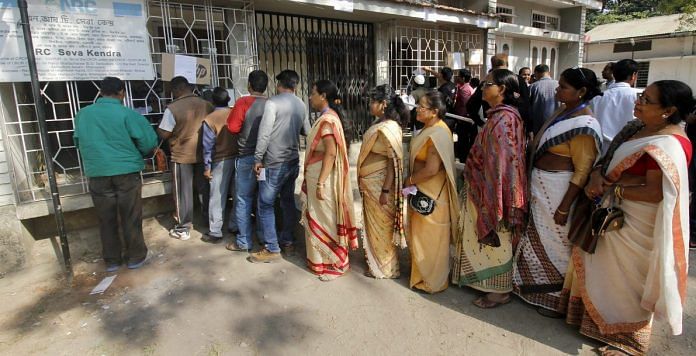First draft of National Register of Citizens released; BJP pushing for it since it came to power in 2016, Congress says NRC update was its brainchild.
New Delhi: With the Assam government releasing the first draft of the National Register of Citizens (NRC), an uneasy political game has begun in the state over the contentious exercise.
It is, however, too early to say if the ruling BJP, which has been pushing for NRC updation since it came to power in the state in 2016, will actually benefit from it.
Hours after the first list was released on 31 December midnight, former Assam chief minister and senior Congress leader Tarun Gogoi was quick to claim the NRC was his party’s “brainchild” and was started during its tenure.
The first draft has declared 1.9 crore people of total 3.29 crore applicants as legal citizens of India. The entire purpose of this exercise, which has been monitored by the Supreme Court, has essentially been to identify and eventually evict illegal immigrants from Bangladesh.
The influx of illegal immigrants from Bangladesh has been a delicate political issue in Assam, and their deportation had been BJP’s key campaign theme ahead of the 2016 assembly election.
In the BJP’s campaign, the line between anti-immigrant resentment in the state and the resentment against Muslim immigrants as a whole had been blurred, turning the issue even more sensitive.
The party had cleverly polarised the issue, making a distinction between Hindu immigrants and the Muslim ones.
The BJP had, in fact, promised citizenship to Hindu refugees even in its 2014 manifesto. To take it further, the Citizenship Amendment Bill, introduced by the NDA government in the Lok Sabha in 2016, proposes to make illegal migrants who are Hindus, Sikhs, Buddhists, Jains, Parsis and Christians from Afghanistan, Bangladesh and Pakistan, eligible for citizenship.
While the exercise was not initiated by the present BJP government in the state, the party would want to appropriate all credit for it, in order to prove to its constituency how committed it is to making Assam ‘illegal immigrant free’.
However, given the complex nature of this exercise and the many dimensions attached to it, it is too early to say if the BJP will actually be in any position to make real gains from it.
To begin with, publishing the names of genuine citizens is largely a judicial process and the real politics will begin only once the entire list is out and when the actual process of eviction has to happen. The feasibility of physically deporting those identified as ‘illegal immigrants’ is hugely questionable, a fact that is not lost on the BJP.
For the BJP to get any serious political benefits from it, there has to be an actual shift in demography, with the state succeeding in altering its social fabric by pushing those whom it identifies as ‘illegal immigrants’ out. The BJP believes Bangladeshi immigrants have enjoyed political patronage from the Congress, which has ruled Assam for decades.
In fact, what is true is that whichever party succeeds in completing the exercise will get a huge political boost in the state, given the massive public resentment against illegal Bangladeshi immigrants and their claims on the state’s resources.
But everything is not hunky-dory for the BJP. The party is aware that there is growing anger among Assamese people, including its own voter base, for having to dig out their documents and prove their citizenship, when they believe it should be the Bangladeshi immigrants who should be facing the trouble.
There is also the underlying fear of the ethnic Assamese Muslims being actively targeted in the process. The fact that the BJP is aiming only at the Muslim Bangladeshi immigrants has made the indigenous Assamese Muslim concerned.
Having enjoyed political patronage, several illegal immigrants have their identity documents in place, while several indigenous Muslims may have to struggle to put together their documents, becoming vulnerable in the process.






